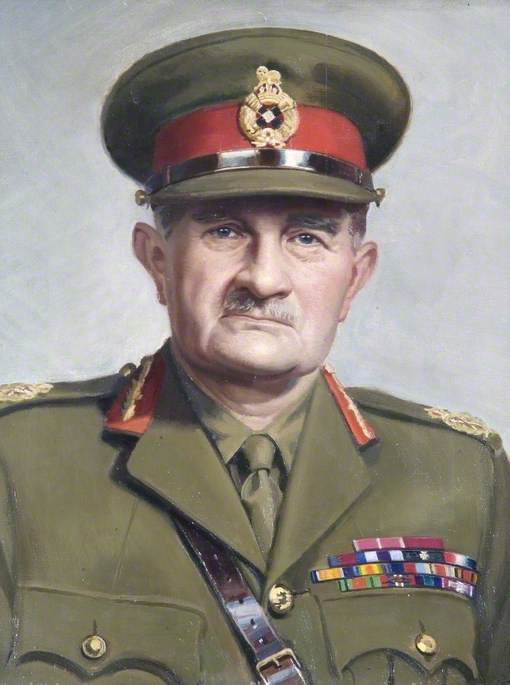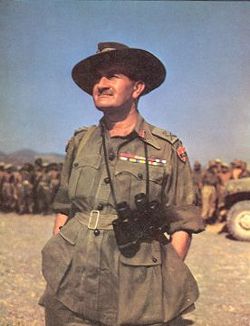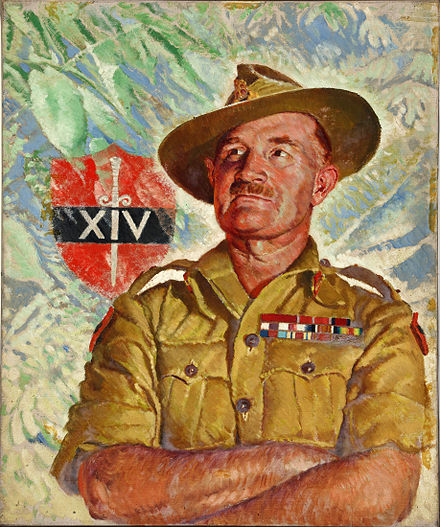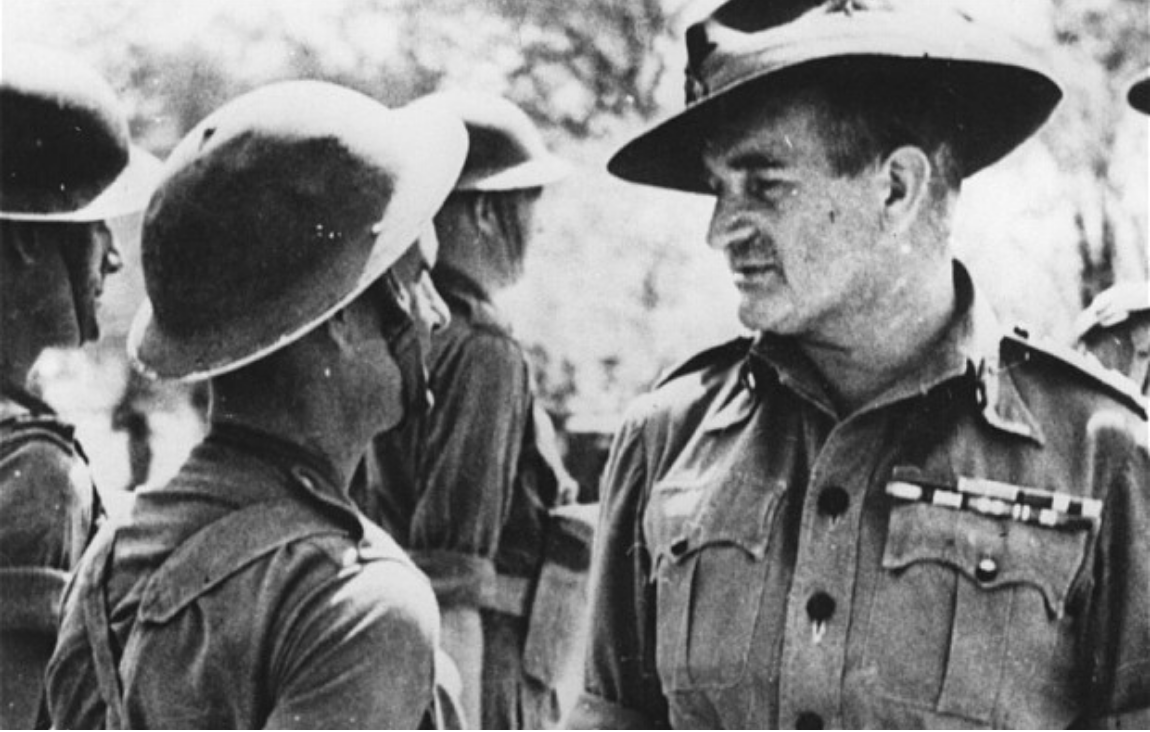
Slim should be remembered as the greatest British general of World War Two.
Even the most sketchily educated Briton today will nevertheless recognise in the murky depths of their consciousness the name of that great British general of World War Two, Montgomery of Alamein. To an older generation perhaps another name resonates equally and perhaps more strongly, the name of a man Montgomery airily dismissed as a mere ‘sepoy general’, and yet someone whose military legacy has arguably outlasted even that of the great ‘Monty’ himself.
That the name of Field Marshal William Slim is remembered by only a few old soldiers and interested military buffs today is a tragedy of enormous proportions, when one assesses in the great weighing scales of history his contribution to Britain’s success in the Second World War and his more longer lasting contribution to the art and science of war as a whole.
The war in the Far East is easy to forget, given that it took place far from home and in the shadow of the titanic struggle against Nazism in Europe. Yet the war against Japan in Burma, India and China was no less titanic, as two competing empires collided violently, with profound implications for the future of the post-war global order, not just in the Pacific but also for the whole of Britain’s creaking empire. Slim played a significant part in the whole story.
Slim was, first and foremost, a born leader of soldiers. It would be inconceivable to think of Monty as ‘Uncle Bernard’, but it was to ‘Uncle Bill’ that soldiers in Burma, from the dark days of 1942 and 1943, through to the great victories over the Japanese in 1944 and 1945, put their confidence and trust.
He inspired confidence because he instinctively knew that the strength of an army lies not in its equipment or its officers, but in the training and morale of its soldiers. Everything he did as a commander was designed to equip his men for the trials of battle, and their interests were always at the forefront of his plans.
He knew them because he was one of them, and had experienced their bitterest trials. Brigadier Bernard Fergusson (later Earl Ballantrae and Governor General of New Zealand), believed that Slim was unlike any other British higher commander to emerge in the Second World War, ‘the only one at the highest level in that war that… by his own example inspired and restored its self-respect and confidence to an army in whose defeat he had shared.’
Not for him the aristocratic or privileged middle class upbringing of some many of his peers, but an early life of industrial Birmingham, relieved only by the opportunities presented for advancement by the upheavals of the First World War. The 100 day 1000 mile retreat from Burma to India in 1942, the longest in the long history of the British Army was, whilst a bitter humiliation, nevertheless not a rout, in large part because Slim was put in command of the fighting troops.
He managed the withdrawal through dust bowl, jungle and mountain alike so deftly that the Japanese, though undoubtedly victorious, were utterly exhausted and unable to mount offensive operations into India for a further year. In time Slim was given the opportunity no British soldier has been given since the days of Wellington: the chance to train an army from scratch and single-handedly mould it into something of his own making, an army of extraordinary spirit and power against which nothing could stand.
By 1945 Slim’s 14th Army, at 500,000 men the largest ever assembled by Britain, had decisively and successively defeated two formidable Japanese armies, the first in Assam in India in 1944 and the second on the banks of the great Irrawaddy along the infamous ‘Road to Mandalay’ in Burma in 1945.
Slim’s victories in 1944 and 1945 were profound, and yet were quickly forgotten by a Britain focused principally on the defeat of Germany, and by a United States gradually pushing back the barriers of Japanese militaristic imperialism in the Pacific. In late 1943 the 14th Army had begun to call itself the ‘Forgotten Army’, because of the apparent lack of interest back home of their exertions. 
Sadly, from the time of the last climactic battles and the dash to seize Rangoon in May 1945 Slim’s achievements as the leader of this great army have equally been forgotten, although not of course by those who served under him who were all, as Mountbatten declared, ‘his devoted slaves’, nor indeed by their children and grandchildren who together make the Burma Star Association the only old soldiers’ association that actually continues to grow, rather than diminish.
What were these achievements? In terms of his contribution to Allied strategy in Burma and India between 1942 and 1945 they were threefold. First, he prevented, by his dogged command of the withdrawal from Burma the invasion of India proper in 1942 by a Japanese Army exulting in its omnipotence after the collapse of the rest of East Asia and the Pacific rim.
Second, he removed forever any further Japanese ambitions to invade India proper by his destruction of Mutaguchi’s legions in the Naga Hills around Kohima and the Manipur Plain around Imphal in the spring and early summer of 1944, and in so doing he decisively shattered the myth of Japanese invincibility that had for so long crippled the Allied cause.
Third, despite the prognostications of many, and subtly influencing Mountbatten to conform to his own strategy, Slim drove his armoured, foot and mule-borne and air-transported troops deep into Burma in late 1944 and 1945, across two of the world’s mightiest rivers, to outwit and outfight the 250,000 strong Burma Area Army of General Kimura and in so doing engineer the complete collapse of Japanese hegemony in Burma.
Given the pattern of British misfortune in 1942 and in 1943 it is not fanciful to argue that without Slim neither the safety of India (in 1942 as well as in 1944), nor the recovery of Burma in 1945, would ever have been possible. Slim’s leadership and drive came to dominate the 14 Army to such a degree that it became, in Jack Master’s phrase, ‘an extension of his own personality.’
Slim’s achievements need also to be examined from a more personal, professional perspective. That he was able to defend India’s eastern borders from imminent doom, and crush both Mutaguchi and Kimura in the gigantic and decisive struggles of 1944 and 1945 was due to his qualities as a military thinker and as a leader of men.
Slim was a master of intelligent soldiering. That a man becomes one of the most senior officer of his generation is not always evidence per se that he has mastered this most fundamental of requirements: in Slim’s case it was.
His approach to the building up of the fighting power of an army – from a situation of profound defeat and in the face of crippling resource constraints – is a model that deserves far greater attention today than it has received in the past. It was an approach built on the twin platforms of rigorous training and development of each individual’s will to win, through a deeply thought-out programme of support designed to meet the physical, intellectual and spiritual needs of each fighting man.
Slim’s description of General Sir George Giffard, his superior for a time, can equally be applied to himself: Giffard’s great strength, Slim commented, lay in his grasp of ‘the fundamentals of war – that soldiers must be trained before they can fight, fed before they can march, and relieved before they are worn out.’
Second, Slim was a remarkable coalition commander. The Army that defeated the might of the Japanese in both India and Burma during 1944 and 1945 was a thoroughly imperial one, seventy-five percent Indian, Gurkha and African. Even in the British Empire of the time it was not self-evident that a British officer would secure the commitment of the various diverse nationalities he commanded: indeed, many did not. 
In his study of military command the psychiatrist Norman Dixon considered Slim’s quite obvious ability to join many of these diverse national groups to fight together in a single cause to be nothing less than remarkable, and the antithesis of the norm.
That he did so at a time of social and political unrest in India with the anti-colonial ‘Quit India’ campaign, and in the face of some early desertions to the Japanese-sponsored Indian National Army under Subhas Chandra Bose, makes his achievements even the more remarkable. The British soldier was also suspicious of officers of the Indian Army, but Slim succeeded effortlessly in winning them over, too. 
He ‘was the only Indian Army general of my acquaintance that ever got himself across to British troops’ recalled Fergusson. ‘Monosyllables do not usually carry a cadence; but to thousands of British troops, as well as to Indians and to his own beloved Gurkhas, there will always be a special magic in the words “Bill Slim.”
But in addition to his success in defeating the Japanese in 1944 and 1945, and in building up 14 Army to become a formidable fighting machine, Slim’s most abiding legacy was his approach to war, which at the time was singularly different to that adopted elsewhere during the war, either by Monty in Africa and North West Europe or Alexander in Italy.
Slim’s pre-eminent concern was to defeat the Japanese army facing him in Burma, not merely to recover territory, and he determined to do this through the complete dominance of the Japanese strategic plan. Training his troops relentlessly through monsoon, mountain and jungle, joining the command and operation of his land and air forces together, so that they served a single object, and delegating command to the lowest levels possible, Slim created an army of a power and fighting spirit rarely ever encountered in the history books.
In 1944 he allowed Mutaguchi’s 100,000 strong 15 Army to extend itself deep into India, there to be met by a ruthlessly determined 4 Corps, supplied by air and attacking at every opportunity the tenuous Japanese lines of communication back to the Chindwin. It was high risk, and more than one senior officer in Delhi and London despaired of success.
Slim, however, knew otherwise, and in the process of the climatic battles of Imphal and Kohima he succeeded in shattering the cohesion of a whole Japanese army and destroying its will to fight, a situation as yet unheard of for a fully formed Japanese army in the field. There were a number of close calls, and Slim was always the first to admit to his mistakes, but his steady nerve never failed. He moulded the Japanese offensive to suit his own plans, and step-by-step, he decisively broke it in the hills of eastern Assam and the Imphal plain.
Many commanders would then have sat on their laurels. Not so Slim. He was convinced that real victory against the Japanese required an aggressive pursuit, not just to the Chindwin but into the heart of Burma itself. Single-handedly he worked to put in place all the ingredients of a bold offensive to seize Mandalay at a time when every inclination in London and Washington was to seek an amphibious solution to the problem of Burma and thus avoid the entanglements of a land offensive.
Slim believed, however, that it could be done. Virtually alone he drove his plans forward, winning agreement and acceptance to his ideas as he went, particularly with Mountbatten, the Supreme Allied Commander in the Far East, and went on to execute in Burma in 1945 one of the most brilliant expositions of the strategic art that warfare has ever seen.
He did this in the face of difficulties of every sort and degree. Employing his abundant strategic initiative to the full, he succeeded in outwitting and destroying an even larger army under General Kimura along the Irrawaddy between Meiktila and Mandalay in the spring of 1945, Kimura himself describing Slim’s operation as the ‘masterstroke of allied strategy’. In both these operations Slim prefigured the doctrine of ‘manoeuvre warfare’.
Although Slim would not have recognised the term, his exercise of command in 14 Army indicates clearly that he espoused all of the fundamental characteristics. The modern British Army defines it as ‘the means of concentrating force to achieve surprise, psychological shock, physical momentum and moral dominance… At the operational level, manoeuvre involves more than just movement; it requires an attitude of mind which seeks to do nothing less than unhinge the entire basis of the enemy’s operational plan.’
It argues that the extreme military virtue does not lie, as Monty practised, in the direct confrontation of the enemy mass, in an attempt to erode his strength to the point where he no longer has the physical wherewithal to continue the contest, but rather in the subtlety of the “indirect approach”, where the enemy’s weaknesses rather than his strengths are exploited, and his mental strengths and, in particular his will to win are undermined without the necessity of a mass-on-mass confrontation of the type that characterised so much of Allied operations on both the Western and Eastern Fronts in Europe during the Second World War. Slim’s exercise of command in Burma makes him not merely a fine example of a ‘manoeuvrist’ commander but in actuality the template for modern manoeuvrist command.
‘Slim’s revitalisation of the Army had proved him to be a general of administrative genius’ argues the historian Duncan Anderson: ‘his conduct of the Burma retreat, the first and second Arakan, and Imphal-Kohima, had shown him to be a brilliant defensive general; and now, the Mandalay-Meiktila operation had placed him in the same class as Guderian, Manstein and Patton as an offensive commander.’
Mountbatten claimed that despite the reputation of others, such as the renowned self-publicist, Montgomery of Alamein, it was Slim who should rightly be regarded as the greatest British general of the Second World War. Slim’s failing was to deprecate any form of self-publicity believing, perhaps naively, that the sound of victory had a music all of its own. The ‘spin doctors’ of our own political generation have sadly taught us something Monty knew instinctively and exploited to his own advantage, namely that if you don’t blow your own trumpet no one else will.
The final word should be left to one who served under him. ‘“Bill” Slim was to us, averred Antony Brett-James, ‘a homely sort of general: on his jaw was carved the resolution of an army, in his stern eyes and tight mouth reside all the determination and unremitting courage of a great force.
His manner held much of the bulldog, gruff and to the point, believing in every one of us, and as proud of the “Forgotten Army” as we were. I believe that his name will descend into history as a badge of honour as great as that of the “Old Contemptibles.” Sadly, Slim’s name and achievements have not done what Brett-James hoped, and it is now the responsibility of a new generation to understand and appreciate his achievements.’
Robert Lyman’s A War of Empires will be published by Osprey in November 2021.
————————————————————————————–Lord William Slim in the House of Lords London UK